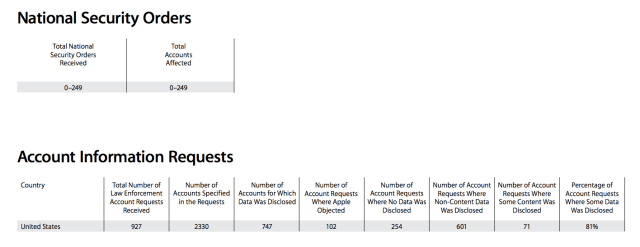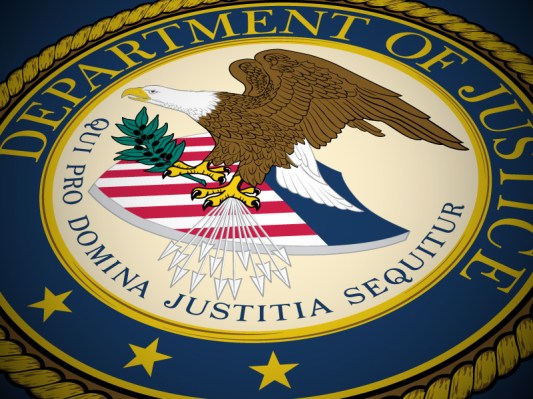Apple today released more details on the requests it receives from government surveillance agencies after the Department Of Justice releaxed limits on disclosures. Apple, Google, Facebook, Microsoft, Yahoo, and LinkedIn today were given the right to disclose more details on the data requests and orders they receive from the Foreign Intelligence Surveillance Court after suing the government for months to declassify these numbers.
The Attorney General Eric Holder and Director of National Intelligence James Clapper released a statement today, first reported by the Wall Street Journal, that says “Through these new reporting methods, communications providers will be permitted to disclose more information than ever before to their customers. The office of the Director of National Intelligence…has determined that the public interest in disclosing this information now outweighs the national security concerns that required its classification.”
Google, Facebook, Microsoft, Yahoo, and LinkedIn all agreed to drop their lawsuits in exchange for the declassification.
Apple has published a new letter describing its relationship with the government surveillance agencies and releasing narrower ranges of numbers of National Security Orders for data that it’s received. As seen below, Apple received between zero and 249 National Security Orders on a number of accounts in that rage. Apple received 927 total law enforcement account requests about 2330 accounts, disclosed data on 747 accounts, objected 102 times, disclosed no data on 254 accounts, disclosed non-content dta on 601 accounts, disclosed some content on 71 accounts, and the percentage of account requests where some data was disclosed was 81%.

Note how these numbers are more detailed than those Apple released on November 5th, 2013:

The ability to disclose specific numbers could boost confidence amongst tech companies’ users that the government’s data requests are specific and targeted, not a dragnet pulling in everyone.
As I wrote in June, ambiguity in surveillance is what causes fear. That fear can be seen as a double-edged sword. While ambiguity could prevent true threats to national security from understanding our surveillance methods, it also worries innocent users that they’re being needlessly spied on. By striking a better balance in terms of specificity, the tech companies hope to reassure their users while still letting the NSA do its job of trying to protect the United States.
Unfortunately, in the monthd since the big tech companies began asking for more disclosure freedom, we’ve seen Edward Snowden’s leaks indicate that the NSA doesn’t necessarily have to go through official channels to get user data. That means people might not care about how many times the government knocked on the front door or was let in when it can always go through the back door.
—
Here’s the full text of the statement from the Department Of Justice.
Department of Justice
Office of Public Affairs
FOR IMMEDIATE RELEASE
Monday, January 27, 2014
Joint Statement by Attorney General Eric Holder and Director of National Intelligence James Clapper on New Reporting Methods for National Security OrdersAttorney General Eric Holder and Director of National Intelligence James Clapper released the following joint statement Monday:
“As indicated in the Justice Department’s filing with the Foreign Intelligence Surveillance Court, the administration is acting to allow more detailed disclosures about the number of national security orders and requests issued to communications providers, and the number of customer accounts targeted under those orders and requests including the underlying legal authorities. Through these new reporting methods, communications providers will be permitted to disclose more information than ever before to their customers.
“This action was directed by the President earlier this month in his speech on intelligence reforms. While this aggregate data was properly classified until today, the office of the Director of National Intelligence, in consultation with other departments and agencies, has determined that the public interest in disclosing this information now outweighs the national security concerns that required its classification.
“Permitting disclosure of this aggregate data resolves an important area of concern to communications providers and the public. In the weeks ahead, additional steps must be taken in order to fully implement the reforms directed by the President.
“The declassification reflects the Executive Branch’s continuing commitment to making information about the Government’s intelligence activities publicly available where appropriate and is consistent with ensuring the protection of the national security of the United States.”
